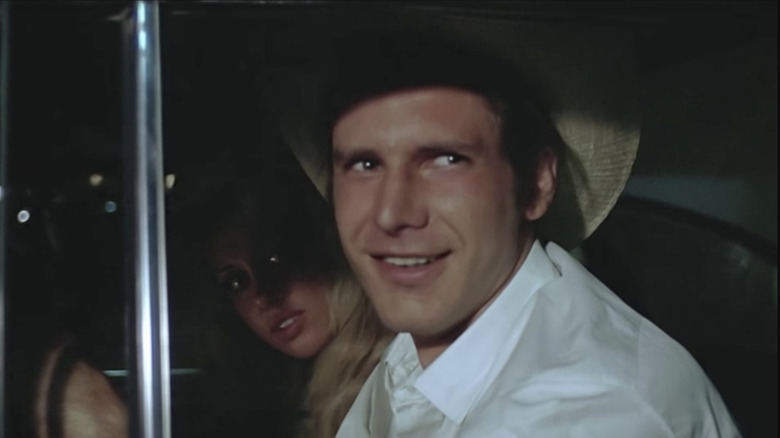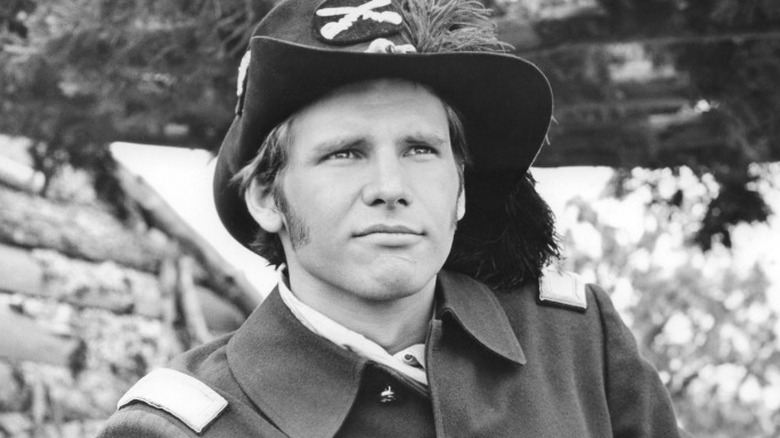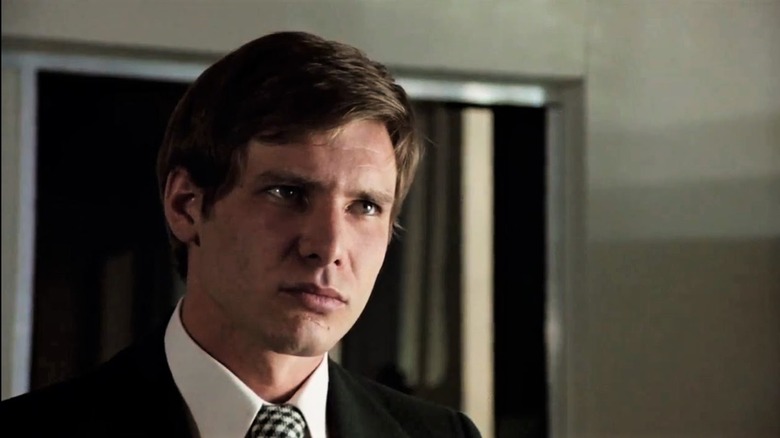Harrison Ford's Time Under Contract At Columbia Was A Far Cry From The Hollywood Dream
In Bernard Girard's 1966 crime flick "Dead Heat on a Merry-Go-Round," James Coburn plays a con man who, having charmed his way out of prison, uses seduction and larceny to plan a major bank heist at Los Angeles International Airport. The film has not been noted in many major cinema journals, however, other than to mark it as the first notable, uncredited appearance of a young Harrison Ford, then only 23, who appeared as a bellhop.
Ford, now 80, has become one of the more recognizable and celebrated movie stars of his generation, having appeared in some of the highest-profile action-adventure films of all time. As the adage goes, however, it took a long time for Ford to become an overnight success. Throughout the late 1960s and early 1970s, Ford appeared in several films and TV shows as a bit player or an extra. After "Dead Heat on a Merry-Go-Round," for instance, he appeared on two episodes of "The Virginian." In cinemas, he was off to the side in the 1968 Western "Journey to Shiloh," and played "arrested teen" in Michelangelo Antonioni's infamous 1970 arthouse drama "Zabriskie Point." In 1973, Ford threw in with one George Lucas, then making a nostalgia piece called "American Graffiti," leading to his eventual collaboration on a certain notable 1970s space opera.
Those first few years, however, were rough for Ford. As described in the 2008 biography "Harrison Ford: The Films" by Brad Duke, Ford was a mere contract player for Columbia. This was a position, the actor admitted, he wished he had known more about before signing onto it.
A Time for Killing
According to Brad Duke's book, Harrison Ford wasn't much interested in acting when he was attending university at Ripon College in Wisconsin. Indeed, Ford was a philosophy major. Despite his confidence on camera and forthright attitude in interviews, he claims to have been a shy individual and wanted to take acting classes to combat it. Ford loved acting so much, he decided to make it his calling and moved to Los Angeles to look for gigs.
Luckily — or perhaps unluckily — Ford was welcomed into Columbia Pictures' New Talent program. The program, however, wasn't geared toward helping young actors be discovered, instead keeping them legally bound to low-paying studio work. Ford, not knowing much about the industry, signed a seven-year deal with Columbia, forcing him to appear in Columbia movies exclusively in exchange for very small paychecks. Ford was fine with the terms in 1964, however, through nothing more than monumental naivete — thought that he would have to pay the studio for the honor of working there. In Ford's own words:
"I started at Columbia Pictures at $150 a week, and I enjoyed all the respect that it implies. I think mail clerks were making more money. I wasn't worth more than $150 a week, to tell you the truth."
However much he felt he was worth, Ford's time at Columbia was horrendous, and he talks a lot about how the talent "factory" was still running through filmmaking and acting practices from several decades previous. He wasn't so much allowed to participate in acting projects or rehearsals as he was expected to follow very fast orders. And, to make things worse, none of the American studios were making very interesting movies. Ford claims that the good work was in Europe, and the local studios were too busy partying.
The other Harrison Ford
In Harrison Ford's words:
"It was 1964-65 and Columbia was still playing 1920-30. You had to come to the studio every day attired in jacket and tie, go to acting class, eat in the executive dining room, submit yourself to photo layouts — six starlets and six fellas playing football on a Malibu beach in front of a Chevrolet Nova for Argosy magazine ... Nobody knew your name or cared a damn about you. I went nuts! ... All the studios were making their biggest films in Europe, everybody in Hollywood was taking acid and smoking dope, and I was a baby actor getting nowhere."
The trials didn't end there. The Columbia machine did try to groom their actors to be movie stars, but they used the same stylistic tactics on everyone. Hip hairstyles and clothes, it seems, were all that was required. It was all a very curt affair. Hilariously, when Ford was asked to change his name — he was told that "Harrison Ford" sounded too arch and arty — he suggested "Kurt Affair" as a replacement. That was rejected. Luckily, when Ford made it big, no one mixed him up with the silent film star that shared his name. It was because of the first Harrison Ford that today's Harrison Ford was initially credited as Harrison J. Ford. As it so happens, Ford has no middle name.
Ford was eventually, and mercifully, fired. When Columbia's head left town, his replacement swooped in and "re-evaluated" his role at the studio. The replacement producer, Jerry Tokofsky, stated out loud that Ford was worthless, and that he would be kept on out of mere pity. Ford refused to sign a new contract, and many four-letter words were said.
Ford then went over and signed with Universal, and the rest is history.


